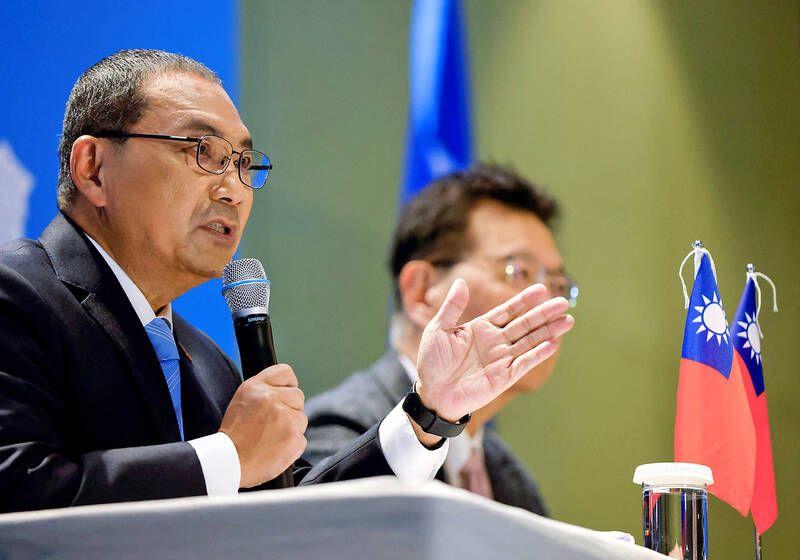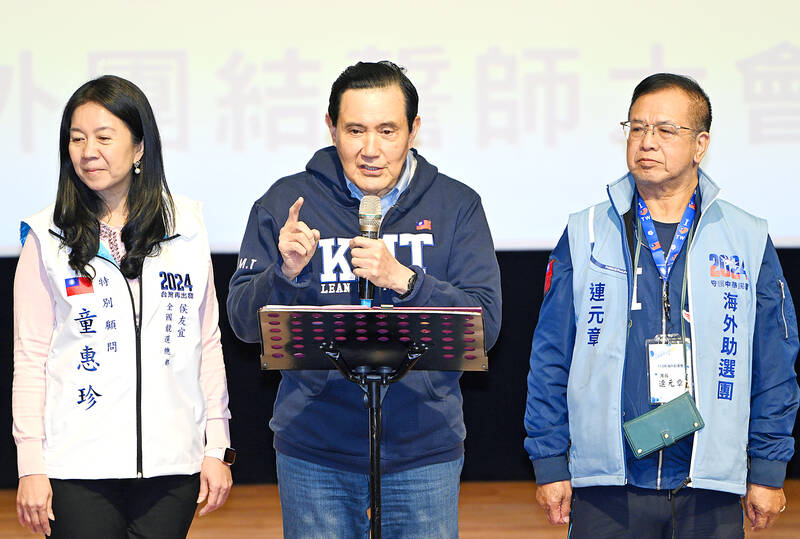The Chinese Nationalist Party (KMT) yesterday did not invite former president Ma Ying-jeou (馬英九) to its election-eve rally in New Taipei City tonight, as the party seems to distance itself from Ma’s remarks that Taiwan can “never win against China.”
Ma sparked controversy as he told Deutsche Welle in an interview on Saturday that “as far as cross-strait relations go, you have to” trust Chinese President Xi Jinping (習近平).
The former president also said he does not believe Xi is pushing for unification, and advocated for reducing the defense budget and conscription period, as Taiwan could not win in a conflict with China.

Photo: Carlos Garcia Rawlins, Reuters
Ma’s office yesterday said that he would not attend the KMT’s rally in New Taipei City’s Banciao District (板橋), as he did not receive an invitation.
It would be the first time the former president was not invited to a major election rally held by the KMT.
New Taipei City Mayor Hou You-yi (侯友宜), the party’s presidential candidate, at an international news conference in Taipei yesterday continued to distance himself from Ma’s comments by telling reporters he would not talk about unification if elected.

Photo: Tien Yu-hua, Taipei Times
Asked about the types of issues he would address if invited to meet with Xi, Hou said things are very different from when Ma was in office.
“Former president Ma and I have very different positions on certain issues. If I am elected, I will not touch on issues regarding unification with China. When it comes to cross-strait issues, we cannot rely on goodwill from one side. It would be very dangerous if we have absolutely no preparation before addressing them,” Hou said.
Taiwan needs to walk on a “third path” between China and the US, and the nation’s self-defense capabilities are crucial, Hou said.
“As a former detective, I know you cannot negotiate with a criminal if you do not get your raid squad ready first. If leaders across the Taiwan Strait should meet, there must be consensus on this matter from Taiwanese society. At this stage, I think there remains a long way to go before leaders in Taiwan and China can meet,” he said, adding that cross-strait exchanges can begin in the private sector.
Hou pledged to increase procurement of weapons as well as military exchanges with the US and continue to support indigenous submarine programs to bolster asymmetric warfare capabilities.
“We are no comparison with China when it comes to defense spending, but we are confident that China would not dare start a war in the Taiwan Strait, because it is a price it cannot pay,” he said.
Hou added that he would maintain the “status quo” by opposing independence and China’s “one country, two systems” policy.
“The status quo under the ruling Democratic Progressive Party (DPP) is pushing Taiwan to the brink of a war... The status quo I am pursuing is peace and stability across the Taiwan Strait, and it is the responsibility of leaders not to provoke war,” Hou said.
Hou quoted from an article published by Eurasia Group on Monday, saying that the US’ three dangerous friends are Israeli Prime Minister Benjamin Netanyahu, Ukrainian President Volodymyr Zelenskiy and DPP presidential candidate Vice President William Lai (賴清德).
“I can be a regional peacekeeper and play an important role in contributing to world peace. I am not a dangerous friend,” he said.
Hou’s running mate Jaw Shaw-kong (趙少康) at the news conference said that what has happened in Hong Kong has shown “one country, two systems” is a complete failure, and Taiwan would never accept such a system.
Asked about the significance of several US delegations arriving in Taiwan to watch the elections, Jaw said that this is normal, as the results would affect relations among the US, Taiwan and China.
However, he said it would be dangerous if Lai is elected president.
“If Lai wins, we would not have to wait until he takes office on May 20 to see an imminent crisis across the Taiwan Strait,” he said.
“It takes two to tango. We need to blame Beijing for tensions across the Taiwan Strait, but does the DPP bear no responsibility at all? During Ma’s terms as president, the US also said its relations with Taiwan were rock solid. The US even listed Taiwan in its visa-waiver program,” Jaw said.
“Tsai kept a rather low profile by not regularly professing her pro-independence stance, but tensions in the Strait have nevertheless escalated. If Lai is elected, he would surely worsen cross-strait relations. Will tense cross-strait relations be a good thing for the US?” he asked.
While Hou and Jaw said they are against Chinese meddling in Taiwan’s elections, they also criticized the DPP for using Chinese interference as an excuse for its “lackluster” performance over the past eight years or to accuse KMT candidates of selling out the nation.
The DPP government should investigate reports of election interference based on evidence, but it should not use cheap tricks to win the election, Hou said.
Taiwan needs to communicate with China, just as US President Joe Biden needs to talk to Xi, Jaw said.
Meanwhile, the three parties fielding presidential candidates prepared for their election-eve rallies to be held tonight.
The KMT rally is to begin at 7:30pm at Banciao Stadium.
Aside from Hou and Jaw, the event is to be attended by other party heavyweights such as KMT Chairman Eric Chu (朱立倫), legislator-at-large nominee Han Kuo-yu (韓國瑜) and Taipei Mayor Chiang Wan-an (蔣萬安).
The DPP is to hold its rally blocks away at the Banciao Second Stadium at 6pm, after holding another rally last night on Ketagalan Boulevard in Taipei.
Authorities advised getting to Banciao early, as the area is expected to see more than 100,000 people gather for the rallies.
The Taiwan People’s Party booked Ketagalan Boulevard for its event starting at 6:30pm.
Additional reporting by CNA

NATIONAL SECURITY THREAT: An official said that Guan Guan’s comments had gone beyond the threshold of free speech, as she advocated for the destruction of the ROC China-born media influencer Guan Guan’s (關關) residency permit has been revoked for repeatedly posting pro-China content that threatens national security, the National Immigration Agency said yesterday. Guan Guan has said many controversial things in her videos posted to Douyin (抖音), including “the red flag will soon be painted all over Taiwan” and “Taiwan is an inseparable part of China,” while expressing hope for expedited “reunification.” The agency received multiple reports alleging that Guan Guan had advocated for armed reunification last year. After investigating, the agency last month issued a notice requiring her to appear and account for her actions. Guan Guan appeared as required,

DAREDEVIL: Honnold said it had always been a dream of his to climb Taipei 101, while a Netflix producer said the skyscraper was ‘a real icon of this country’ US climber Alex Honnold yesterday took on Taiwan’s tallest building, becoming the first person to scale Taipei 101 without a rope, harness or safety net. Hundreds of spectators gathered at the base of the 101-story skyscraper to watch Honnold, 40, embark on his daredevil feat, which was also broadcast live on Netflix. Dressed in a red T-shirt and yellow custom-made climbing shoes, Honnold swiftly moved up the southeast face of the glass and steel building. At one point, he stepped onto a platform midway up to wave down at fans and onlookers who were taking photos. People watching from inside

A Vietnamese migrant worker yesterday won NT$12 million (US$379,627) on a Lunar New Year scratch card in Kaohsiung as part of Taiwan Lottery Co’s (台灣彩券) “NT$12 Million Grand Fortune” (1200萬大吉利) game. The man was the first top-prize winner of the new game launched on Jan. 6 to mark the Lunar New Year. Three Vietnamese migrant workers visited a Taiwan Lottery shop on Xinyue Street in Kaohsiung’s Gangshan District (崗山), a store representative said. The player bought multiple tickets and, after winning nothing, held the final lottery ticket in one hand and rubbed the store’s statue of the Maitreya Buddha’s belly with the other,

‘NATO-PLUS’: ‘Our strategic partners in the Indo-Pacific are facing increasing aggression by the Chinese Communist Party,’ US Representative Rob Wittman said The US House of Representatives on Monday released its version of the Consolidated Appropriations Act, which includes US$1.15 billion to support security cooperation with Taiwan. The omnibus act, covering US$1.2 trillion of spending, allocates US$1 billion for the Taiwan Security Cooperation Initiative, as well as US$150 million for the replacement of defense articles and reimbursement of defense services provided to Taiwan. The fund allocations were based on the US National Defense Authorization Act for fiscal 2026 that was passed by the US Congress last month and authorized up to US$1 billion to the US Defense Security Cooperation Agency in support of the